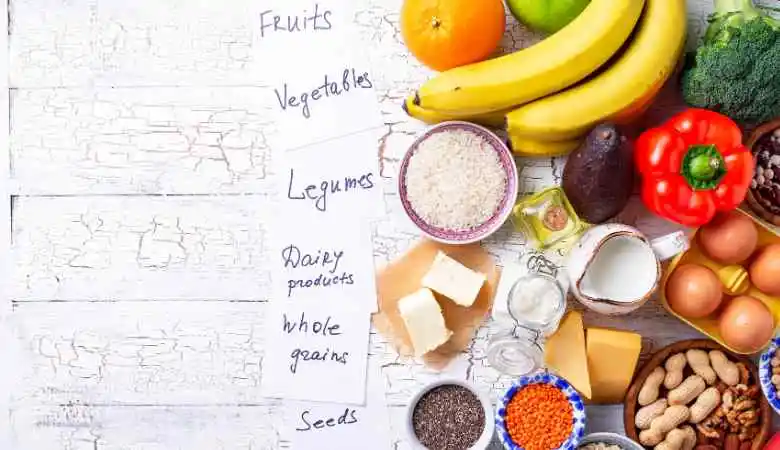Following a vegetarian diet can be beneficial for your health. Still, ensuring you get all the essential nutrients is vital to avoid deficiencies. Our general practitioners will advise you if you consider adopting a diet without animal proteins.
Vegetarian Diet: What is it?
The vegetarian diet is a dietary pattern that excludes meat and fish consumption. Vegetarians eat mainly plant-based products such as fruits, vegetables, grains, legumes, nuts and seeds. There are different forms of vegetarianism:
- Lacto-ovo-vegetarianism: People who follow this diet exclude meat and fish but consume dairy products (Lacto) and eggs (ovo);
- Lacto-vegetarianism: Followers of this diet avoid meat, fish and eggs but include dairy products such as yoghurt or cheese;
- Ovo-vegetarianism: Ovo-vegetarian people avoid meat, fish and dairy products but eat eggs;
- Veganism: Also known as the vegan diet, veganism completely excludes all animal products, including meat, fish, dairy, eggs, and honey. Vegans eat only plant-based foods.
The reasons for choosing a vegetarian diet can vary among individuals, ranging from health concerns to ethical or environmental beliefs.
What are the Benefits of a Vegetarian Diet?
The vegetarian diet offers many health benefits, including:
- Better heart health: Generally, vegetarian diets are associated with a reduced risk of cardiovascular disease. They are often rich in fibre, antioxidants and unsaturated fatty acids, which can help lower cholesterol levels and improve heart and blood vessel health.
- Weight control: A balanced vegetarian diet rich in plant-based foods tends to be lower in calories and saturated fat, which can help maintain a healthy weight.
- Better management of type 2 diabetes: Studies suggest that vegetarian diets can help control blood sugar and improve insulin sensitivity in people with type 2 diabetes.
- Reduced risk of certain cancers: Vegetarian diets rich in fruits, vegetables, fibre and phytonutrients may be associated with a reduced risk of certain cancers, including colorectal cancer.
- Improved digestion: Vegetarian diets rich in fibre from fruits, vegetables, legumes and whole grains can promote better digestion and reduce gastrointestinal problems ;
- Environmental sustainability: The vegetarian diet helps reduce its environmental impact by reducing the consumption of water resources and greenhouse gas emissions associated with intensive animal farming.
To fully reap the benefits of a vegetarian diet, it is essential to plan your diet to get all the necessary nutrients. It is recommended to consult a dietician or nutritionist for advice tailored to your needs.
What are the Risks of a Vegetarian Diet?
Adopting a vegetarian diet has several health benefits. Still, it is also important to know the potential risks associated with this type of diet:
- Deficiency of certain nutrients: A poorly planned vegetarian diet can lead to deficiencies in essential nutrients such as vitamin B12, iron, calcium and omega-3 fatty acids. However, these deficiencies can be avoided by planning your diet and choosing your foods wisely.
- Increased iron requirements: Non-heme iron (present in plants) is less easily assimilated by the body than heme iron (present in meat). Vegetarians should, therefore, ensure they consume sufficient sources of iron and combine it with vitamin C to improve its absorption.
- Excessive dependence on certain foods: People adopting a vegetarian diet may tend to turn to certain foods such as processed products rich in simple carbohydrates or ultra-processed meat substitutes, foods which are harmful to health.
- Risk of unbalanced food choices: Some people may adopt a vegetarian diet with little variety, which can lead to a deficiency in certain nutrients or excessive consumption of other nutrients.
- Social impact: In certain social situations, such as family meals or outings with friends, it can be challenging to find vegetarian options because vegetarianism is not always well perceived or understood, creating uncomfortable situations.
How do you avoid deficiencies when adopting a vegetarian diet?
To avoid deficiencies on a vegetarian diet, ensure you get all the nutrients essential for the body to function correctly. Here are a few tips:
- Protein: Include plant-based protein sources such as legumes (lentils, chickpeas, beans), tofu, tempeh, soy products and whole grains;
- Iron: Eat iron-rich foods, such as green vegetables (spinach, kale), legumes, pumpkin seeds, dried fruits and whole grains. For better iron absorption, combine these foods with those rich in vitamin C, such as citrus fruits, peppers or tomatoes;
- Calcium: Since dairy products may be excluded from some vegetarian diets, opt for calcium-rich alternatives such as fortified soy milk, leafy green vegetables, tofu prepared with calcium, nuts (almonds, walnuts) and sesame seeds;
- Vitamin B12: This vitamin is only found in products of animal origin (meat, fish, dairy products and eggs). People following a vegan diet must consume food supplements or foods enriched with B12 (plant milk, for example);
- Omega-3: Opt for plant-based sources of omega-3 like flaxseeds, walnuts, flaxseed oil and algae to maintain a good balance of essential fatty acids;
- Iodine: Be sure to include iodized salt in your diet or eat seaweed, a good iodine source.
If you face nutritional deficiencies despite a balanced and varied diet, do not hesitate to seek support from a health professional.
What is the vegetarian diet for?
In principle, most people can adopt a vegetarian diet if they plan carefully to ensure they get all the essential nutrients. However, it is important to take into account certain aspects:
- Health status: A vegetarian diet may require special attention in certain situations. For example, pregnant people, growing children, or people with special nutritional needs should be especially vigilant to get all the necessary nutrients;
- Food and cultural preferences: Individual preferences and eating habits can make adopting a vegetarian diet more or less straightforward. Some people may find the transition more accessible than others;
- Nutritional planning and knowledge: Planning your diet well is crucial to avoiding nutritional deficiencies. Understanding plant protein sources, key nutrients and how to balance meals is essential for a successful vegetarian diet.
With proper planning and attention to the variety of foods eaten, most individuals can adopt a vegetarian diet without significant problems. However, it is always advisable to consult a healthcare professional before making significant changes to your diet, especially if any specific concerns are present.
How do you get support when you want to become a vegetarian?
There are several ways to get support when you want to become vegetarian:
- Consultation with a healthcare professional: A nutritionist or dietician can offer personalized advice by developing a meal plan tailored to your nutritional needs. They can help you avoid deficiencies while adopting a balanced vegetarian diet;
- Research and documentation: Books, websites, and specialized resources can provide detailed information on vegetarianism, essential nutrients, and balanced recipes for a vegetarian diet;
- Community and support groups: Joining online or in-person support groups can be beneficial. They provide a space to ask questions, share experiences, and find support from people with the same desires and goals.
- Cook and experiment: Learning new recipes and experimenting with cooking can make the transition more exciting and enjoyable. Vegetarian cooking classes may also be available locally or online;
- Apps and tools: Apps and online tools are easily accessible and can help you plan meals, track nutritional intake, and discover new vegetarian-friendly recipes.
Combining these resources and being open to learning and exploring new food options makes it possible to make a smooth transition to a vegetarian diet while maintaining a balanced and nutritious diet.


